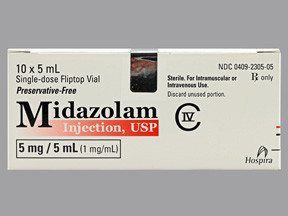MIDAZOLAM - INJECTION
PHONETIC PRONUNCIATION: (mi-DAZ-oh-lam)
COMMON BRAND NAME(S): Versed
GENERIC NAME(S): midazolam HCl
Uses
USES: Midazolam is used before surgery or a procedure. It helps to cause drowsiness, decrease anxiety, and to decrease your memory of the surgery or procedure. This medication may also be used to help with anesthesia or to sedate people who need a tube or machine to help with breathing. Midazolam works by calming the brain and nerves. It belongs to a class of drugs known as benzodiazepines.
How to use MIDAZOLAM - INJECTION
HOW TO USE: This medication is given by slow injection into a vein or muscle as directed by your doctor. It is usually given by a health care professional. The dosage is based on your medical condition, type of procedure you are having, other medications you are receiving, age, weight, and response to treatment. If you are using this medication at home, learn all preparation and usage instructions from your health care professional. Giving this medication too fast into a vein can cause serious side effects. Before using, check this product visually for particles or discoloration. If either is present, do not use the liquid. Learn how to store and discard medical supplies safely. If you suddenly stop using this medication, you may have withdrawal symptoms (such as vomiting, sweating, abdominal/muscle cramps, shaking, seizures, mental/mood changes such as anxiety/agitation). To help prevent withdrawal, your doctor may lower your dose slowly. Withdrawal is more likely if you have used midazolam for a long time or in high doses. Tell your doctor or pharmacist right away if you have withdrawal. When this medication is used for a long time, it may not work as well. Talk with your doctor if this medication stops working well. Though it helps many people, this medication may sometimes cause addiction. This risk may be higher if you have a substance use disorder (such as overuse of or addiction to drugs/alcohol). Take this medication exactly as prescribed to lower the risk of addiction. Ask your doctor or pharmacist for more details.
Side Effects
Precautions
Interactions
Overdose
Images
Reviews
Faq for MIDAZOLAM - INJECTION
Midazolam injection is primarily used to relieve anxiety and produce sedation before medical procedures or surgeries. It may also be used to induce amnesia or help manage seizures or alcohol withdrawal symptoms.
Midazolam injection belongs to a class of medications called benzodiazepines, which work by enhancing the effects of a naturally occurring chemical in the brain called gamma-aminobutyric acid (GABA). This leads to a calming and sedative effect.
Midazolam injection is typically given by a healthcare professional in a hospital or clinical setting. It can be administered intravenously (into a vein), intramuscularly (into a muscle), or orally as a liquid.
Common side effects of midazolam injection include drowsiness, dizziness, confusion, blurred vision, headache, and nausea. Less common but more serious side effects may include difficulty breathing, chest pain, rapid heartbeat, and allergic reactions.
Midazolam injection is generally not recommended during pregnancy, especially during the first trimester. However, the potential benefits and risks should be discussed with a healthcare provider in specific cases.
Midazolam injection can be used in children, but the dosing and administration should be carefully determined by a healthcare professional. It is commonly used in pediatric cases requiring sedation for medical procedures.
Midazolam injection has the potential for abuse and dependence, especially if used for extended periods or in high doses. It should only be used under medical supervision, and the recommended dosage and duration should be followed to minimize the risk of addiction.
The effects of midazolam injection typically last for a short duration, ranging from 1 to 6 hours. The exact duration may vary depending on factors such as the dose, administration route, and individual response.
Midazolam injection can interact with several medications, including certain antibiotics, antifungal agents, antidepressants, anticonvulsants, and opioids. It is important to inform your healthcare provider about all medications you are taking to avoid potential interactions.
Warning
WARNING: Giving midazolam by injection into a vein can sometimes cause severe breathing problems which could rarely lead to brain damage or be fatal. The risk of serious breathing problems is higher with high doses or if midazolam is given too quickly into a vein. Midazolam must be used only under close medical supervision. Infants, children, older adults, or weak patients are more sensitive to the effects of midazolam. Lower doses should be used for these patients. Lower doses of midazolam should be used if a patient is also receiving other medications that cause drowsiness. Newborns must not be given midazolam by rapid injection because of the risk of very serious side effects. Using midazolam with opioid medications (such as codeine, hydrocodone) may increase your risk of very serious side effects, including death. To lower your risk, your doctor should use or have you use the smallest dose of midazolam that works, and use it for the shortest possible time. Get medical help right away if any of these very serious side effects occur: slow/shallow breathing, unusual lightheadedness, severe drowsiness/dizziness, difficulty waking up.
Disclaimer
IMPORTANT: HOW TO USE THIS INFORMATION: This is a summary and does NOT have all possible information about this product. This information does not assure that this product is safe, effective, or appropriate for you. This information is not individual medical advice and does not substitute for the advice of your health care professional. Always ask your health care professional for complete information about this product and your specific health needs.


No Reviews Yet